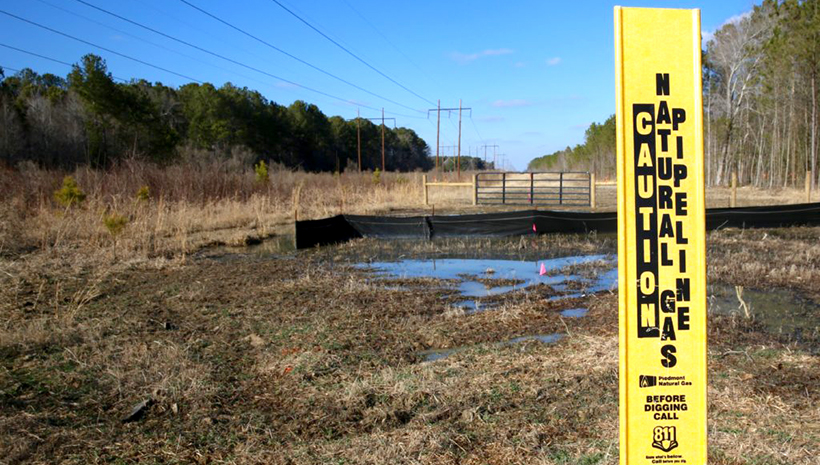Publisher's note: This post appears here courtesy of the Carolina Journal, and written by Dan Way, Associate Editor.
Atlantic Coast Pipeline right-of-way in Halifax County. (CJ photo by Don Carrington)
Two executive orders President Donald Trump signed Wednesday, April 10, could expedite completion of the Atlantic Coast Pipeline and other interstate energy transmission projects that have been delayed by state regulators.
Pipeline permit-delaying tactics by officials in Washington, D.C., and New York influenced Trump's decision to sign the executive orders. Energy companies also have pressured Trump to act.
"My actions today will cut through destructive permitting delays and denials," he said during an appearance at the oil town of Crosby, Texas. The move streamlines a years-long permitting process to no more than 60 days. The executive orders hit back at special interest groups, entrenched bureaucracies and activists who impose barriers to production that hurt families and undermine national security, he said.
Pipeline companies have complained state political leaders who oppose fossil fuel power can stall multi-state pipeline construction, even if the Federal Energy Regulatory Commission, U.S. Environmental Protection Agency, Army Corps of Engineers, and other federal regulators sign off on the work. State officials and environmental groups also have sued to delay or stop projects.
Under the federal Clean Water Act, states must certify Section 401 water quality permits before pipeline construction can begin. States can place conditions on the permits to protect the environment, but Trump thinks they sometimes trample the intent of the federal act.
Under one executive order, the EPA will review and update outdated guidance regarding Section 401 certification, a White House
fact sheet said.
The second executive order empowers the president alone to issue or deny a permit for projects that cross international borders. The Secretary of State would continue to receive permit applications and advise the president whether a project serves U.S. foreign policy interests.
"Under this administration we've ended the war on American energy," Trump said. Surrounded by members of the International Union of Operating Engineers who work in oil and gas fields, the president claimed credit for policies creating more than 60,000 pipeline construction jobs, erection of 450 new oil and gas rigs, and making the U.S. the world's top oil and gas producer.
David McGowan, executive director of the N.C. Petroleum Council, forwarded a press release from the parent American Petroleum Institute touting the benefits of regulatory predictability resulting from Trump's executive orders. API estimated an average annual boost between $1.52 billion and $6.05 billion in U.S. Gross Domestic Product from 2020 to 2040.
"Bureaucratic barriers have crippled an otherwise strong regulatory regime, preventing the construction of essential infrastructure and unnecessarily contributing to an energy disparity in America," API President and CEO Mike Sommers said in the release.
Gov. Roy Cooper and partners in the stalled $6.5 billion Atlantic Coast Pipeline, which will carry natural gas into North Carolina, didn't respond to requests for comments about Trump's executive orders.
But D.J. Gerken, senior attorney for the Southern Environmental Law Center, warned about Trump's intrusion into states' permitting authority.
"It's contrary to the structure of the Clean Water Act that worked very well from the day it was passed," Gerken said.
The Clean Water Act
"is a state and federal partnership that respects the superior knowledge of individual states to protect their citizens and the particular needs of their waterways," Gerken said.
Gerken argued at the 4th U.S. Circuit Court of Appeals and
won an order halting construction of the ACP. A three-judge panel ruled approving part of the pipeline route in Virginia violated federal regulations unrelated to state 401 water certifications.
But the 401 process is the focus of a
legislative investigation into whether Cooper had a hand in delaying North Carolina's certification of the ACP. The three-state, 604-mile transmission line starts in West Virginia and includes 195 miles in North Carolina.
Republican lawmakers want to know if a $57.8 million discretionary fund the governor would control without legislative oversight was a pay-to-play scheme. Duke Energy, Dominion Energy, and other ACP partners pledged to fund that money pool. At issue is whether Cooper improperly directed the state Department of Environmental Quality to delay the 401 permit certification as he negotiated his side deal.
Carolina Journal first broke the story about the odd nature of Cooper's deal. Lawmakers thwarted the arrangement by passing legislation diverting the money from Cooper's control to school districts in the eight counties where the pipeline will pass.
The
CJ series of stories about the Atlantic Coast Pipeline are available
here.
























